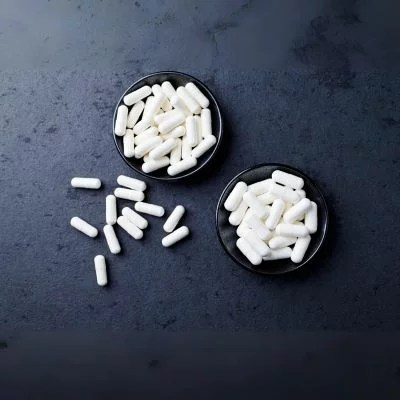Creatine – Powering Fitness Journeys and Unraveling Its Mysteries
Creatine – a term synonymous with strength, endurance, and the pinnacle of fitness achievements. In the realm of health supplements, creatine stands as a titan, widely acclaimed for its role in enhancing athletic performance and muscle building. But what truly is creatine, and how does it weave its magic in our bodies?
Contents
What is Creatine?
Creatine is more than just a buzzword in the fitness industry; it’s a naturally occurring compound found in our muscle cells. Primarily, it’s known for its crucial role in high-intensity training and explosive activities. Creatine enhances the body’s capacity to perform at its peak in short, intense bursts of activity, making it a favorite among athletes and fitness enthusiasts. Discover more about what is creatine and its impact on our bodies.
But beyond its muscle-boosting abilities, creatine is a tale of energy, biology, and innovation. Stored as phosphocreatine in the muscles, it aids in the formation of adenosine triphosphate (ATP), the energy currency of the cell. This process is pivotal for continuous muscle contraction during high-intensity exercise. For a deeper understanding, check out our detailed article on what does creatine do.

The Focus of Our Exploration
While the benefits of creatine, such as increased muscle mass, improved exercise performance, and enhanced recovery, are well-documented, our focus today shifts to a different spectrum – the side effects and safety of creatine supplementation. Is creatine as benign as it is beneficial? Does it carry any hidden risks that warrant attention?
In this article, we’ll meticulously analyze the potential side effects of creatine, exploring how it interacts with our bodies in varied scenarios. From the commonly known to the rarely discussed, we’ll cover all grounds to provide a comprehensive view. For those considering supplementation, understanding the creatine side effects is crucial.
Our journey will also examine the safety profile of creatine. Is it a friend or foe to your health regime? With insights from scientific research and expert opinions, we aim to clear the fog surrounding the safety and efficacy of creatine, guiding you to make informed decisions.
Join us at the Super Achiever Club as we dissect the complexities of creatine, offering a beacon of clarity in a sea of misinformation. Your journey to becoming a super achiever is not just about gaining muscle; it’s about gaining knowledge.
This introduction sets the stage for a deep dive into the world of creatine, blending scientific insights with a narrative that resonates with the ethos of the Super Achiever Club. The article aims to enlighten, engage, and educate readers, paving the way for informed decisions in their fitness and health journeys.
Understanding Creatine
What is Creatine?
Creatine: A term often echoed in gyms and fitness circles, but what truly lies behind this famed supplement? At the Super Achiever Club, we delve into the essence of creatine, unraveling its mysteries and showcasing its pivotal role in the fitness world.
The Science of Creatine
- Creatine is a naturally occurring compound, synthesized in the human body from amino acids.
- Primarily found in muscle cells, it plays a critical role in energy production, particularly during high-intensity, short-duration exercises like sprinting or weightlifting.
- By aiding in the regeneration of adenosine triphosphate (ATP), creatine serves as a quick energy source for muscles, enhancing physical performance and endurance.
- For a deeper understanding of creatine’s role in energy metabolism, explore our extensive guide on what creatine does.
Creatine Monohydrate: The Gold Standard
- Among various forms of creatine, creatine monohydrate reigns supreme in popularity and research backing. Its efficacy and safety have been the subject of extensive studies.
- This form is praised for its high purity and excellent absorption rate, making it a top choice for athletes and fitness enthusiasts.
- Despite its benefits, potential side effects, such as bloating or water retention, are topics of ongoing research and discussion. Learn more about the best creatine monohydrate.
Diversity in Creatine Forms
- While creatine monohydrate is the most studied, other forms like creatine hydrochloride (HCL) and micronized creatine offer unique benefits and preferences.
- For instance, creatine HCL is claimed to have better solubility and absorption, potentially reducing side effects related to digestive discomfort. Delve into the comparison between creatine HCL and monohydrate.
- Micronized creatine, with its finer particles, is designed for quicker dissolution and reduced potential for stomach upset. Discover the top picks in best micronized creatine.
Creatine in Various Forms and Uses
- The market is abundant with creatine products ranging from powders to capsules, and even gummies, catering to diverse preferences and lifestyles.
- Whether it’s the convenience of best creatine capsules or the innovative approach of best creatine gummies, there’s a format for every user.
- Understanding the nuances of each form, from how to take creatine effectively to choosing the best creatine for men and best creatine for women, is crucial in maximizing its benefits.
The Spectrum of Creatine Side Effects
Common Side Effects of Creatine
- Water Retention
- One of the most frequently reported side effects of creatine is increased water retention in the muscles.
- This phenomenon, often misconstrued as weight gain, is actually a natural response, as creatine draws water into muscle cells, enhancing their size and strength.
- Understand more about how creatine influences body composition in our detailed analysis on does creatine make you gain weight.
- Digestive Issues
- Some individuals report experiencing digestive discomfort, such as bloating or stomach cramps, particularly when consuming high doses of creatine.
- Opting for micronized creatine or spreading out the dosage throughout the day can alleviate these symptoms. Explore our recommendations on the best creatine supplements for sensitive stomachs.
- Muscle Cramping
- A less common but notable side effect is muscle cramping, which may occur due to imbalances in hydration and electrolytes, exacerbated by increased muscle water content.
- Ensuring adequate hydration and electrolyte intake is crucial, especially during intense training periods. Learn more about managing creatine intake during workouts in our guide on creatine before or after workout.

Less Common Side Effects of Creatine
- Kidney Stress
- Concerns about creatine impacting kidney health have been raised, particularly in individuals with pre-existing kidney conditions.
- However, research suggests that for healthy individuals, moderate creatine supplementation does not adversely affect kidney function. Delve into the research findings on this topic in our article is creatine safe.
- Liver Function
- Another area of concern is the potential impact of creatine on liver health. While rare, some cases of liver dysfunction have been associated with excessive creatine use.
- It’s vital to adhere to recommended dosages and consult healthcare professionals, especially for individuals with liver conditions. Discover the nuances of creatine dosage in our comprehensive guide on how much creatine should I take.
Debating Creatine’s Safety
Research on Long-Term Use of Creatine
- Decades of Research: Over the past 25 years, extensive research has been conducted on creatine, focusing on its safety and efficacy. The cumulative evidence suggests that, for most individuals, long-term creatine supplementation is safe and does not lead to adverse health effects. For a comprehensive overview, delve into our article on the safety and efficacy of creatine monohydrate.
- No Significant Health Risks: Studies have consistently shown that long-term creatine use does not lead to significant health risks in healthy individuals. This includes no detrimental effects on kidney or liver function, a common concern among many. Explore the scientific findings in detail in our resource on creatine and kidney health.
- Monitoring and Moderation: While the consensus is in favor of creatine’s safety, it’s crucial to approach supplementation with a mindset of moderation and individual assessment. Regular monitoring, especially for those with pre-existing health conditions, is advised. Find out more about responsible creatine usage in our guide on how much creatine should I take.
Addressing Myths vs. Facts
- Myth: Creatine Causes Dehydration and Cramping
- Fact: Contrary to this common myth, studies have found no direct link between creatine use and increased risk of dehydration or muscle cramping. In fact, creatine may enhance hydration within muscle cells.
- Myth: Creatine Damages Kidneys and Liver
- Fact: While caution is advised for individuals with pre-existing kidney or liver conditions, for healthy individuals, there is no substantial evidence to suggest that creatine causes damage to these organs. Detailed insights are available in our exploration of creatine safety.
- Myth: Creatine Leads to Unnatural Muscle Growth
- Fact: Creatine enhances muscle growth through natural biological processes, primarily by increasing water content in muscle cells and supporting ATP production. It does not induce muscle growth through hormonal or artificial means. Discover the science behind creatine’s effects on muscle in our guide on what does creatine do.

Special Considerations and Risks
Creatine and Specific Population Risks
- Adolescents and Young Athletes
- The use of creatine in adolescents and young athletes is a topic of ongoing debate.
- While research indicates creatine can be beneficial for muscle growth and sports performance, the long-term effects on a developing body are less clear.
- Parents, coaches, and young athletes should approach creatine use with caution and preferably under medical supervision. Insights into this topic can be found in our detailed guide on best creatine for men.
- Individuals with Pre-existing Conditions
- For those with pre-existing kidney, liver, or heart conditions, creatine supplementation could pose additional risks.
- Creatine may exacerbate issues in these individuals due to its effects on muscle water retention and metabolism.
- It’s imperative to consult healthcare professionals before starting creatine. Explore the nuances in our article on creatine safety.
Interaction with Medications and Other Supplements
- Medications
- Creatine may interact with certain medications, potentially altering their effectiveness or increasing side effects.
- Particularly, medications related to kidney function, blood sugar control, and diuretics could interact adversely with creatine.
- Always consult with a healthcare provider before combining creatine with any medication.
- Other Supplements
- Combining creatine with other supplements, especially those that affect hydration and electrolyte balance, requires careful consideration.
- For example, combining creatine with caffeine or beta-alanine may enhance performance but also increase the likelihood of side effects like dehydration or cramping.
- We delve deeper into this subject in our guide on best creatine supplements.
Responsible Use of Creatine
Guidelines for Safe Consumption of Creatine
- Start with the Right Dosage
- The general recommendation for creatine dosage is 3-5 grams per day. However, starting with a lower dose and gradually increasing can help assess tolerance.
- For detailed dosage guidelines, explore how much creatine should I take.
- Consider a Loading Phase
- A loading phase, typically involving taking a higher dose of creatine for a short period, can rapidly increase muscle creatine stores. However, this is optional and not necessary for everyone.
- Understand the pros and cons of the loading phase in our guide on creatine loading phase.
- Stay Hydrated
- Adequate hydration is crucial while taking creatine, as it tends to increase water retention in muscles.
- Drinking plenty of water can help mitigate some side effects like cramps and digestive issues.
- Monitor Your Body’s Response
- Pay attention to how your body reacts to creatine, especially during the initial stages. Any adverse reactions should be taken seriously.
Consulting Healthcare Providers
- It’s imperative to consult with a healthcare provider before starting creatine, especially for individuals with pre-existing health conditions.
- Professional advice is invaluable in determining the suitability of creatine and its interaction with any medications or conditions.
Special Considerations for Athletes and Fitness Enthusiasts
- Timing of Intake
- The timing of creatine intake can influence its effectiveness. While opinions vary, consuming creatine post-workout might offer additional benefits.
- For insights into timing, read our article on when to take creatine.
- Combining with Nutrition and Exercise
- Pairing creatine with a carbohydrate or protein-based meal can enhance its uptake.
- Integrating creatine with a well-structured training program is crucial for maximizing its benefits. Learn more about this in how to take creatine.
- Regular Review of Creatine Use
- Regularly assessing the need for ongoing creatine supplementation is important. Periods of discontinuation or cycling off may be beneficial.
Navigating the Creatine Landscape with Wisdom and Care
Key Takeaways

- Understanding Creatine: We started by demystifying creatine, highlighting its role in muscle energy metabolism and the various forms it takes, with a focus on creatine monohydrate. Knowledge is power, and understanding what creatine is, sets the foundation for its responsible use. For a refresher, revisit our section on what is creatine.
- Side Effects and Safety: We navigated through the spectrum of creatine’s side effects, from common issues like water retention to less common concerns about kidney and liver health. Our discussion emphasized that while creatine is generally safe, it’s not without potential side effects.
- Special Considerations and Risks: Addressing specific populations and interactions with other medications or supplements, we emphasized the importance of individualized consideration in supplementation.
- Responsible Use: Our guidelines for safe consumption, from appropriate dosing to hydration, highlight the ethos of responsible supplementation, aligning with the core values of the Super Achiever Club.
Emphasizing Individualized Consideration
- Every individual’s journey with creatine is unique. Factors like age, health conditions, and fitness goals play a crucial role in determining the suitability and approach to creatine supplementation.
- Understanding one’s body and health status is paramount.
A Call to Action
🌟 Seek Professional Advice: We cannot overemphasize the importance of consulting healthcare providers before starting any supplement regimen, including creatine. Professional guidance is invaluable in tailoring supplementation to your unique health needs and goals.
🌟 Stay Informed, Stay Empowered: At the Super Achiever Club, our mission is to empower you with knowledge. We encourage you to continue exploring and learning, using resources like our comprehensive guide on creatine benefits.

🌟 Make Informed Choices: Your journey to becoming a super achiever in health and fitness is a journey of continuous learning and adaptation. Make informed choices, and let wisdom guide your path to success.
As we conclude, remember that the journey with supplements like creatine is not just about enhancing physical performance; it’s about nurturing an informed, health-conscious mindset. At the Super Achiever Club, we are here to support you on this journey, providing the knowledge and resources you need to make the world a better place, starting with your health.

